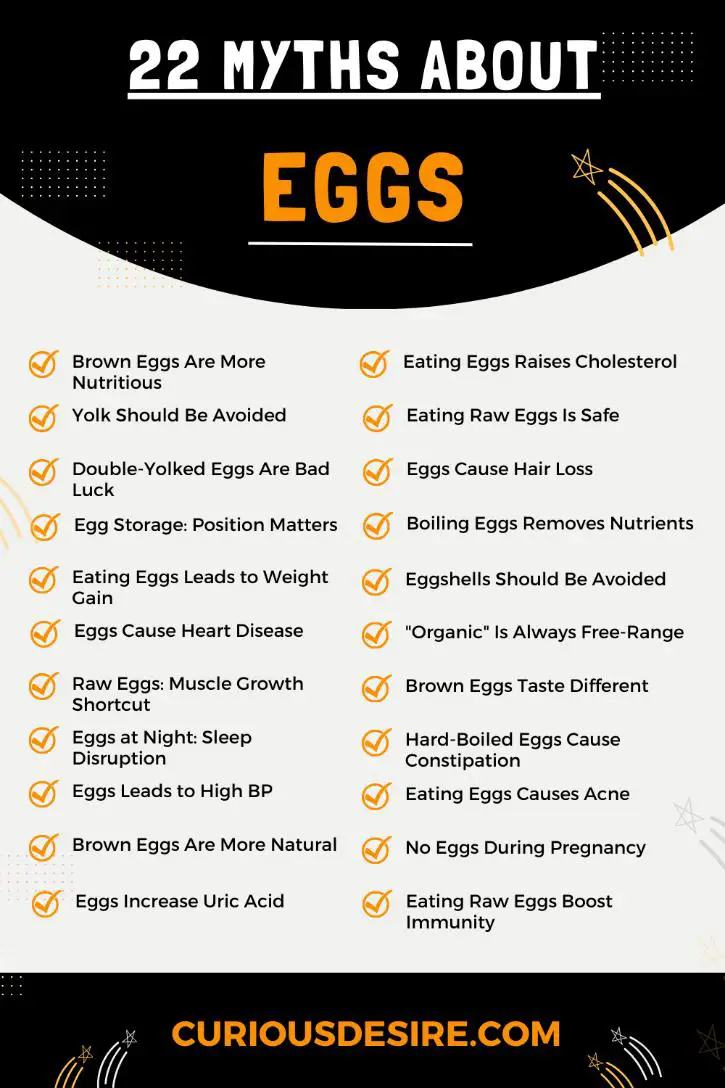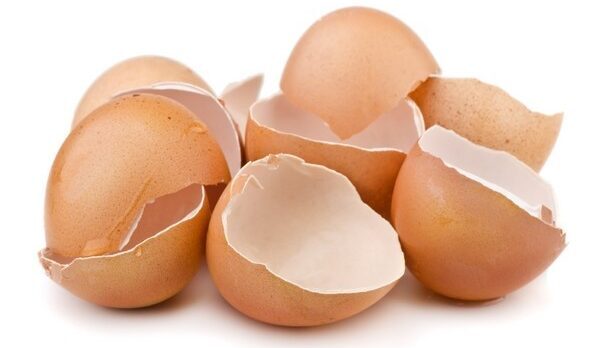Eggs are a versatile and nutrient-rich food source enjoyed worldwide. Despite their widespread popularity, numerous myths persist about their impact on health.
In this article, we will bust common myths about eggs. Let’s get started!
Here are the 5 most common myths about eggs:
- Brown Eggs Are More Nutritious Than White Eggs.
- Eating Eggs Raises Cholesterol Levels.
- Only the Egg White Is Healthy; the Yolk Should Be Avoided.
- Eating Raw Eggs Is Safe.
- Double-Yolked Eggs Are Bad Luck.
[toc]

Myth 1: Brown Eggs Are More Nutritious Than White Eggs
Why the Myth Exists:
The belief that brown eggs are more nutritious than white eggs stems from a simplistic association between color and quality.
People often perceive brown as a more “natural” or “organic” color, assuming it signifies superior nutritional content.
Debunking the Myth:
In reality, the color of the eggshell is determined by the breed of the chicken and has no bearing on its nutritional value.
Both brown and white eggs offer similar nutritional profiles, providing essential nutrients like protein, vitamins, and minerals.
Myth 2: Eating Eggs Raises Cholesterol Levels
Why the Myth Exists:
This misconception arises from the idea that dietary cholesterol translates directly into blood cholesterol.
Debunking the Myth:
Extensive research has demonstrated that moderate egg consumption does not significantly affect cholesterol levels for most individuals.
The body’s cholesterol regulation is complex, and eggs can be part of a heart-healthy diet, offering valuable nutrients without adverse effects.
Myth 3: Only the Egg White Is Healthy; the Yolk Should Be Avoided
Why the Myth Exists:
The myth originated from early efforts to simplify dietary advice by categorizing foods as “good” or “bad” based on specific nutrients.
This oversimplification led to the misconception that the egg white is healthy, while the yolk should be avoided due to its cholesterol and fat content.
Debunking the Myth:
Contrary to the myth, the egg yolk is a nutrient powerhouse. It contains essential nutrients like vitamins A, D, E, and K, along with omega-3 fatty acids.
Moderation is key, and including the whole egg in your diet provides a more comprehensive nutritional profile.
Myth 4: Eating Raw Eggs Is Safe
Why the Myth Exists:
The myth that eating raw eggs is safe lies in the association of raw eggs with notions of natural purity.
Some individuals may perceive raw foods as more “natural” or less processed, assuming that consuming them aligns with a healthier lifestyle.
Debunking the Myth:
While raw eggs are a common ingredient in some recipes, they carry a risk of salmonella contamination.
Cooking eggs thoroughly eliminates this risk, ensuring safe and nutritious consumption.
This myth may persist due to cultural practices or misconceptions about the necessity of consuming raw eggs for specific health benefits.
Myth 5: Double-Yolked Eggs Are Bad Luck
Why the Myth Exists:
Superstitions often link unusual occurrences to luck, and finding a double-yolked egg was historically considered an omen.
Debunking the Myth:
The phenomenon of eggs with two yolks is relatively rare and occurs during the formation process within the hen’s reproductive system.
It happens when a hen releases two yolks into the oviduct at the same time, and both become enclosed within a single shell.
This occurrence is generally attributed to a temporary disturbance in the hen’s reproductive cycle, causing the release of two eggs simultaneously.
Therefore, the presence of a double yolk is a natural outcome of a hen’s reproductive cycle and has no bearing on luck or fortune. It’s simply a fascinating variation in egg formation.
Myth 6: Eating Eggs Daily Causes Hair Loss
Why the Myth Exists:
Eggs contain dietary cholesterol, and there has been historical concern about the relationship between cholesterol and overall health.
Hair loss, being a visible and concerning issue, might be wrongly linked to egg consumption based on concerns about cholesterol,
Debunking the Myth:
Scientifically, there’s no evidence supporting the notion that egg consumption leads to hair loss. Hair health is influenced by various factors, including genetics, overall diet, and lifestyle choices.
This myth may have arisen from the misunderstanding of the complex factors contributing to hair loss and the role of nutrition in hair health.
Myth 7: Eggs Should Be Stored With the Pointed End Down
Why the Myth Exists:
Inside an egg, there is an air cell located at the larger, rounded end.
Storing eggs with the pointed end down is believed to keep the air cell at the top, reducing the risk of contamination and extending shelf life.
This practice originated in the days when eggs were primarily sourced locally, and transportation methods were less sophisticated.
Debunking the Myth:
In reality, the storage position of eggs has no impact on freshness or quality. Proper refrigeration is critical to ensuring egg safety and longevity.
Myth 8: Boiling Eggs Removes All Their Nutrients
Why the Myth Exists:
When eggs are boiled, there are visible changes in texture and color, such as the transformation of the yolk from a runny consistency to a solid one.
People may associate these changes with nutrient loss, assuming that the heat has destroyed essential vitamins and minerals.
Debunking the Myth:
Boiling eggs is a common and practical method of preparation, and while some heat-sensitive nutrients may be affected, boiled eggs retain their essential proteins, healthy fats, and various vitamins.
Myth 9: Eating Eggs Leads to Weight Gain
Why the Myth Exists:
Eggs contain dietary cholesterol and fat, and there has been historical concern that these components contribute to weight gain and cardiovascular issues.
Debunking the Myth:
Eggs are a nutrient-dense food, providing high-quality protein and healthy fats.
Weight gain is influenced by an individual’s overall diet and lifestyle, and moderate egg consumption can be part of a balanced approach to nutrition.
Myth 10: Eggshells Should Be Avoided Due to High Levels of Lead
Why the Myth Exists:
Unfounded concerns about contaminants, including lead, in eggshells have led to the belief that they should be avoided.
Debunking the Myth:
Eggshells are a safe source of calcium and other minerals and are not high in lead. Proper handling and cooking ensure the safety of consuming eggshells.
Myth 11: Eating Eggs Causes Heart Disease
Why the Myth Exists:
Historical associations between dietary cholesterol and heart disease have contributed to the misconception that egg consumption is linked to cardiovascular issues.
Debunking the myth:
Studies suggest that moderate egg consumption is generally considered safe for heart health.
A balanced diet, overall lifestyle, and individual health conditions play more significant roles in cardiovascular well-being.
Myth 12: Eggs Labeled as “Organic” Are Always Free-Range
Why the Myth Exists:
The term “organic” is often associated with natural and ethical farming practices.
People may assume that organic eggs come from hens that are free to roam outdoors, leading to the belief that they are synonymous with free-range eggs.
Debunked:
The term “organic” primarily refers to the feed given to the chickens, not necessarily their living conditions.
While some organic eggs may be free-range, it’s essential to check specific labels for information about the chickens’ living conditions.
Myth 13: Eating Raw Eggs Enhances Muscle Growth
Why the Myth Exists:
Associations between protein consumption and muscle development have led to the belief that consuming raw eggs is a shortcut to enhancing muscle growth.
Debunking the myth:
Cooking eggs does not diminish their protein content, and the myth of raw eggs as a muscle-building aid is not supported by scientific evidence.
Raw eggs pose a risk of salmonella contamination, and cooking eggs thoroughly is a safer and more effective way to include them in a muscle-building diet.
Myth 14: Brown Eggs Taste Different from White Eggs
Why the Myth Exists:
Perceptions about the relationship between color and flavor have contributed to the belief that brown eggs have a distinct taste compared to white eggs.
Debunking the myth:
The taste of eggs is not influenced by the color of the eggshell. Both brown and white eggs have similar flavor profiles, and any perceived differences are likely due to factors such as the chicken’s diet and the freshness of the egg.
Myth 15: Eating Eggs Late at Night Disrupts Sleep
Why the Myth Exists:
Some people may experience indigestion, bloating, or discomfort if they eat a heavy meal before bedtime, contributing to the idea that late-night eating, including eggs, is sleep-disruptive.
Debunking the myth:
There is no evidence linking egg consumption before bedtime to disruptions in sleep. However, moderation in food intake before sleep is generally recommended for overall digestive comfort.
Eggs Myths FAQs
1. What are other interesting facts about eggs?
Eggs are a nutritional powerhouse, rich in protein, vitamins, and minerals. They also contain essential amino acids and healthy fats.
Contrary to previous concerns about cholesterol, recent studies suggest that moderate egg consumption is generally safe and may even have health benefits.
2. What is the latest research on eggs and cholesterol?
Recent research indicates that dietary cholesterol, like that found in eggs, has a minimal impact on blood cholesterol levels for most people.
The focus has shifted to the overall diet’s influence on heart health, with an emphasis on moderation and a balanced, varied intake of nutrients.
3. Can I eat six eggs a day?
While eggs are a nutritious food, consuming six eggs daily might lead to an excessive intake of certain nutrients.
It’s advisable to maintain a balanced diet with a variety of foods for optimal health.
4. Are eggs bad for cholesterol?
Current evidence suggests that eggs, when consumed in moderation, do not significantly raise cholesterol levels in most people.
However, individuals with specific health conditions may need to monitor their dietary cholesterol intake.
5. Can I eat eggs every day?
Yes, most people can enjoy eggs as part of a balanced daily diet. They provide essential nutrients and can be prepared in various ways.
It’s crucial to consider individual health conditions and overall dietary choices.
6. Are eggs unhealthy?
No, eggs are not unhealthy. They are a nutrient-dense food, offering a range of essential nutrients.
However, like any food, moderation is key to maintaining a balanced diet.
7. What are the disadvantages of eggs?
While eggs are nutritious, some individuals may be allergic to them.
Additionally, those with certain health conditions, such as diabetes, may need to monitor their egg consumption. As with any food, moderation is essential.
8. Are eggs good or bad in 2024?
As of 2024, eggs are generally considered a healthy and nutritious food when consumed as part of a balanced diet.
However, individual health factors and dietary preferences should be taken into account.
9. Are boiled eggs healthy?
Yes, boiled eggs are a healthy option. Cooking methods can impact nutrient retention, and boiling eggs is a good way to preserve their nutritional value.
10. Can I eat 10 eggs a day?
Eating 10 eggs a day may lead to excessive calorie and cholesterol intake. It’s advisable to consult with a healthcare professional or nutritionist to determine a diet that meets individual needs.
11. Are fried eggs healthy?
While fried eggs can be part of a balanced diet, it’s essential to consider the cooking oil and overall calorie content.
Opting for healthier cooking methods, like poaching or boiling, may be beneficial.
12. Is it OK to eat 2 boiled eggs a day?
Yes, eating 2 boiled eggs a day can be a healthy part of a balanced diet, providing essential nutrients and protein.
13. How many eggs a day is bad for cholesterol?
There isn’t a specific number of eggs considered universally bad for cholesterol. Individual responses to dietary cholesterol can vary, and moderation is key.



